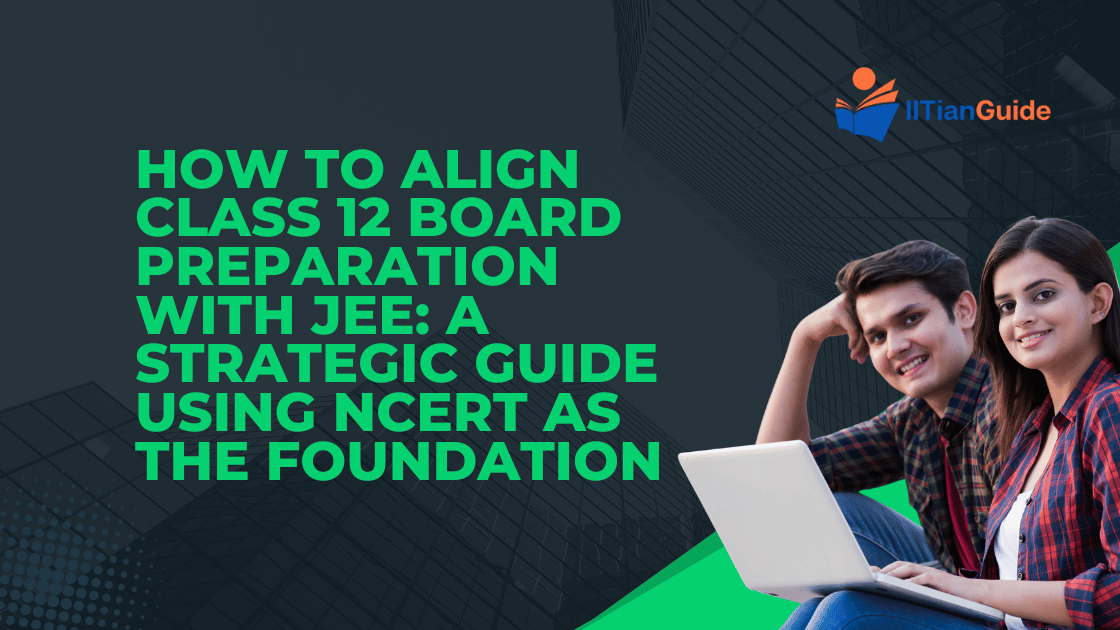How to Align Class 12 Board Preparation with JEE: A Strategic Guide Using NCERT as the Foundation

Preparing for both Class 12 board exams and the Joint Entrance Examination (JEE) can be overwhelming. But with the right approach, you can prepare for both without feeling overloaded. The key lies in smart alignment of your board syllabus with JEE topics, especially by using NCERT textbooks as your base.
In this blog, we will break down how you can create a unified preparation strategy for boards and JEE by using NCERT concepts effectively, without studying separately for each exam.
Why Aligning Boards and JEE Preparation is Crucial
Many Class 12 students make the mistake of preparing for boards and JEE separately. This not only wastes time but also creates confusion. However, over 70% of the JEE syllabus overlaps with the Class 12 board syllabus, especially if you study from NCERT.
NCERT books, especially in Physics, Chemistry, and Mathematics, are the core foundation for both CBSE boards and JEE Mains. If you master NCERT, you automatically cover the fundamentals needed for both exams.
Understand the Syllabus Overlap
Let’s look at how much the board and JEE syllabus actually overlap:
|
Subject |
Topics Common in CBSE Boards and JEE |
|
Physics |
Electrostatics, Current Electricity, Optics, Magnetism, EMI, AC |
|
Chemistry |
Solutions, Electrochemistry, p-block, d- & f-block, Coordination Compounds |
|
Mathematics |
Calculus, Vectors, 3D Geometry, Probability, Matrices & Determinants |
As seen above, almost every major Class 12 topic is relevant for JEE Mains. The difference lies in the depth and problem-solving approach.
Step-by-Step Plan to Align Boards and JEE Preparation
1. Start with NCERT – Build the Strongest Base
NCERT books are your best starting point. They are structured for clarity and are officially recommended for both CBSE and JEE Mains.
- Read every line carefully.
- Highlight key definitions and formulas.
- Solve all intext and exercise questions.
- In Chemistry, especially Inorganic Chemistry, stick to NCERT line by line.
NCERT-based learning builds conceptual clarity, which is vital for both board-style descriptive questions and JEE’s objective questions.
2. Use Board Preparation as the First Layer
Instead of jumping straight into tough JEE problems, follow this sequence:
- Master the theoretical part from NCERT for boards.
- Write answers in the board pattern — include diagrams, definitions, and derivations.
- Once the chapter is board-ready, move on to JEE-level problems.
This saves time and avoids repetition.
3. Upgrade to JEE-Level Questions Strategically
After finishing NCERT and board-level questions, solve JEE-style MCQs from these resources:
- Physics: HC Verma, DC Pandey (Topic-wise)
- Chemistry: NCERT + N Awasthi (Physical), MS Chauhan (Organic), VK Jaiswal (Inorganic)
- Maths: RD Sharma (Boards), then move to Objective Maths by R.D. Sharma or Cengage
Always solve JEE questions immediately after completing the board syllabus of that topic, so the theory remains fresh.
4. Use Common Notes and One Master Register
Create a single register for each subject. Divide each chapter into:
- Concept notes (from NCERT)
- Board-type questions and answers
- JEE short tricks, formulas, and solved problems
This way, you don’t waste time maintaining two sets of notes.
5. Practice Writing for Boards and Speed for JEE
- Weekly: Take 1 long subjective test for boards.
- Daily: Practise JEE MCQs in a timed environment.
- Alternate Days: Revise board content and attempt mock JEE questions on that topic.
Board exams test presentation. JEE tests accuracy and speed. Train for both.
6. Use NCERT Exemplar and PYQs Smartly
- NCERT Exemplar: Advanced level questions based on NCERT concepts.
- Previous Year Questions (PYQs): Solve CBSE board and JEE PYQs regularly to understand trends.
These are gold mines for practice and revision.
Smart Daily Study Plan Example
Here’s a sample routine you can tweak:
|
Time Slot |
Activity |
|
6:00 – 7:30 AM |
Revise yesterday’s board topic (Theory from NCERT) |
|
8:30 – 10:00 AM |
Practise board-style subjective problems |
|
4:00 – 6:00 PM |
Solve JEE MCQs from the same topic |
|
8:00 – 9:00 PM |
Mixed revision – Flashcards, Formulas, PYQs |
Tips for Chemistry, Physics, and Maths
Chemistry
- For Inorganic, stick to NCERT.
- For Physical, understand formulas and practise numericals.
- For Organic, read NCERT theory, practise mechanism-based questions.
Physics
- Learn derivations for boards.
- For JEE, focus on numerical solving using those derivations.
- Use animation or video lectures for conceptual clarity.
Mathematics
- Solve examples and all NCERT exercises.
- Use short tricks and identities to speed up JEE preparation.
- Understand the logic, don’t just memorise formulas.
Mistakes to Avoid
- Don’t study separately for boards and JEE.
- Avoid skipping NCERT, even if you’re enrolled in coaching.
- Don’t memorise without understanding – especially in Physics and Maths.
- Avoid neglecting board exam formats – practice presentation.
Conclusion
By strategically aligning your board exam preparation with your JEE study plan, you save time, avoid duplication, and reinforce your learning. NCERT books should be the heart of your study plan. Boards help you build concepts; JEE builds speed and application.
With the right focus and discipline, you can ace both CBSE Class 12 boards and JEE without burning out.
Frequently Asked Questions (FAQs)
Q1. Can I crack JEE Main by only studying NCERT?
Yes, for Chemistry (especially Inorganic and Organic), NCERT is enough. But for Physics and Maths, you’ll need to supplement with additional books and practice.
Q2. Is board exam preparation helpful for JEE Advanced?
Partially. Boards help with theory and basics. JEE Advanced requires deeper conceptual understanding and tougher problem-solving, which goes beyond NCERT.
Q3. How much time should I give to board preparation daily?
If your base is strong, 1–2 hours daily is enough for board exam-specific writing and revision. Focus the rest of the time on JEE-level questions.
Q4. How to manage coaching with school studies?
Use coaching to focus on concepts and problem-solving. Use school to cover the board theory and writing practice. Combine both through your own notes.
Q5. Should I give more importance to boards or JEE?
If you aim for IITs or NITs, JEE is your main target. But don’t ignore boards. Many colleges (like IISERs, State colleges) have a board cutoff, and good scores also help in backup plans.
If you’re a Class 12 student feeling the pressure of balancing boards and JEE, start by combining both with a NCERT-first approach. Build strong fundamentals and grow from there.

